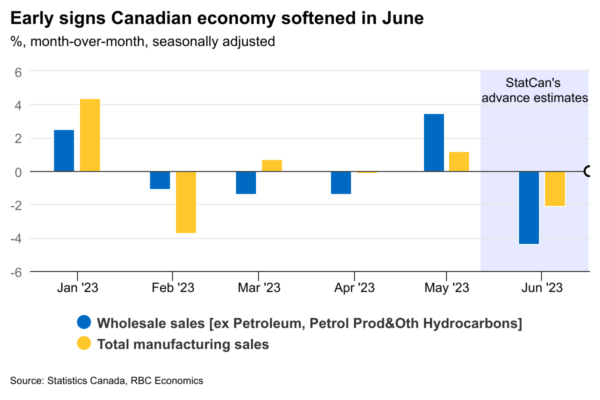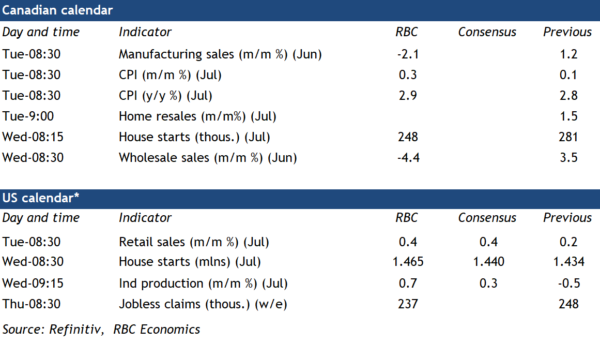Canada’s July CPI report lands among a slew of releases next week. But with the Bank of Canada signaling that its next rate hike decision will hinge on data—it will be the most closely scrutinized. Year-over-year inflation likely edged up to 2.9%. That’s after falling to 2.8% in June, putting it below the top end of the BoC’s 1% to 3% target range for the first time since spring 2021. The uptick in growth can be explained by rising energy prices. Though gas prices were still below year ago levels in July, the decline was smaller than in June. And with oil prices already above $80/barrel in August, energy costs will continue to add upward pressure to inflation in the near-term.
But the BoC will be more focused on broader inflation pressures beyond volatile energy costs. Food price growth probably remained high in July. But the pace of increases likely continued to slow, reflecting the lagged impact of lower commodity prices and easing supply chain disruptions. We expect price growth excluding food and energy products to slow further too, falling to 3% year-over-year from 3.5% in June. Mortgage interest costs will continue to account for a disproportionate share of that growth (accounting for almost a third of total CPI growth)—but the BoC will look through the impact of that component since it is a direct result of higher interest rates. The BoC’s preferred measures of ‘core’ inflation will also be closely watched. Those measures have been ‘stickier’ in recent months. But the three-month rolling average growth rate for the trim and median measures should slow as a large monthly increase in April falls out of that calculation. Growth in trim services ex-shelter (or “supercore”) should also subside, though it’s been running higher than other inflation measures in recent months.
Where broader inflation trends go in the future still depends on the strength of the Canadian economic backdrop. And our own consumer spending tracker still shows resilient spending, particularly for discretionary services. But there have been more signs of softening recently. The unemployment rate is still low, but it’s increased by half a percentage point over the last three months (to the highest levels since February of last year). And manufacturing and wholesale sales reports next week should post steep drops given 2.1% and 4.4% declines, respectively, in Statistics Canada’s preliminary estimates. As more economic weaknesses emerge, underlying price pressures will continue to ease.
Week ahead data watch
Statistics Canada’s early indicator showed “core” wholesale sales dropped 4.4% in June, including a sharp pullback from the machinery, equipment and supplies sector.
Canada’s housing market continues to cool off according to our latest housing report. July home resales data will be closely watched for further signs of easing.
Advance manufacturing sales indicated a 2.1% decline in June. Motor vehicle production likely edged lower, but the advance estimate implies substantial softness in other industries as well.
We expect Canadian housing starts to sink in July, from 281,000 in June to 248,000. Permit issuance ticked up on a 3-month rolling average basis (257,000).
U.S. retail sales likely edged up 0.4% in July, primarily supported by sales increase in the building and auto sectors, and partially offsetting the sales drop at gas stations.
We look for an uptick in the U.S. industrial production (+0.7%) in July. Manufacturing hours worked edged lower in July but electricity output jumped sharply.


